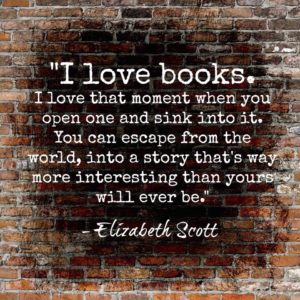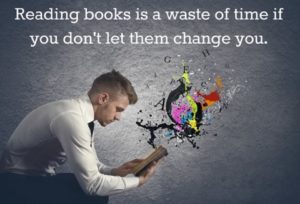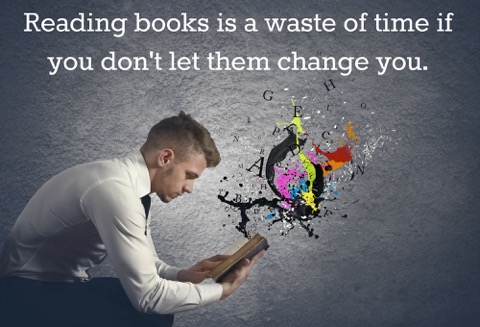Should We Be Reading Books To Escape Reality?
 Books are . . . portals, addictive, powerful, life, opportunities, worlds at your fingertips.
Books are . . . portals, addictive, powerful, life, opportunities, worlds at your fingertips.
These are a few words used to answer the prompt recently posted on my Facebook page. But one of the most common words readers tend to gravitate to is this:
Books are an escape.
You know the spiel: “Leave reality behind!” “Escape into a new world!” Books are portals to temporary freedom from real life.
This is probably one of the most depressing book-quotes I’ve ever read. It’s already deciding that books will be more exciting than my own life. But God didn’t create us to have boring lives.
How many authors had “escapism” in mind when they wrote their books? I know I didn’t. Most authors hope to impress the readers with some sort of message. Maybe even hoping that message will change the reader’s life and actions.
When you read a book, do you use it to escape?
I used to. Only now do I realize that reading books is a waste of time if you don’t let them change you. If books really are “portals” then they should leave you somewhere you weren’t when you finish them. Somewhere enlightened.
 If you know anything about my book, A Time to Die, you know I value the usage of time. I’ve re-evaluated everything I do that takes time, including the “hobby” of reading books. My conclusion is that I can’t excuse the hours I spend reading a fantasy book if they provide me only with escapism.
If you know anything about my book, A Time to Die, you know I value the usage of time. I’ve re-evaluated everything I do that takes time, including the “hobby” of reading books. My conclusion is that I can’t excuse the hours I spend reading a fantasy book if they provide me only with escapism.
God put us on earth for a purpose. And “escapism” is when we avoid that purpose.
I’m not saying we can’t enjoy the portal-like magic behind a book, but we need to gain more from it than a simple eight hours of escape. Let that fantasy book inspire you to pursue a braver faith and epic life. Or learn how not to write from that time-travel flop. Or think about what you want to add to this nation’s future after finishing that dystopian trilogy.
Every book is written with a purpose. We, as readers, should read every book with our own purpose—to learn, to apply, to be inspired . . . and to grow in our faith.
So what do you think? Should we avoid reading for escapism?
– – – – –
 Nadine Brandes is an adventurer, fusing authentic faith with bold imagination. She writes stories about brave living, finding purpose, and other worlds soaked in imagination. Her debut dystopian novel, A Time to Die, released fall 2014 from Enclave Publishing. When Nadine’s not taste-testing a new chai or editing fantasy novels, she is out pursuing adventures. She currently lives in Idaho with her husband.
Nadine Brandes is an adventurer, fusing authentic faith with bold imagination. She writes stories about brave living, finding purpose, and other worlds soaked in imagination. Her debut dystopian novel, A Time to Die, released fall 2014 from Enclave Publishing. When Nadine’s not taste-testing a new chai or editing fantasy novels, she is out pursuing adventures. She currently lives in Idaho with her husband.
Follow Nadine on her website, Facebook, Twitter, and Goodreads. Sign up to receive her
Newsletter: http://nadinebrandes.com/my-newsletter











































Shared and love it. Agree!!!
Nadine, it’s great to have you on SpecFaith. Thanks for an excellent and thoughtful piece!
Amen!
Yet I think some people upon reading that phrase think of “change” in only explicitly religious terms: “Oh, that means that a story should motivate me to some clear moral improvement, or act of charity, or demeanor in church.” Surely these are all very good things. Yet God created human story-giving and culture-making for the purpose of drawing us closer to Him. So I would suggest that we get most out of story-enjoyment when we let the stories (the best ones, anyway) reflect to us His beauty, goodness, and truth. By drawing closer to Him — even in slow, “abstract” ways — we are changed!
Absolutely, Stephen!
Change can be as “small” as a dose of inspiration or as big as an alteration in one’s lifestyle. I’ve read a book I absolutely hated and learned from it that life’s too short to read boring books. That finally broke me of my habit of finishing every book I picked up (thank heavens!)
I like your focus on letting good stories reflect God’s beauty, goodness, and truth. And especially His character of creativity! I encourage people not to use books as an escape because anything used for escape from life/reality can then become an addiction and idol in our lives. (Been there, done that. Ick)
#Sequel …
LOL. Hm….not a bad idea. 😉
In the sense that all of creation is to draw us to God, I agree with this, Stephen. But God created us in His image and therefore as relational communicators, pre-fall. He didn’t need these particular aspects of our image-bearing to draw us closer because the first man and woman had a perfect relationship with Him. So to say story and culture (all aspects of people living in community—language, art, history, etc.) were for the purpose of drawing us closer to Him doesn’t fit the facts, I don’t think.
Then if we look at the stories Jesus told, we see that He didn’t need to draw closer to God (being Himself deity in bodily form). He used stories to enlighten—sometimes about God and His nature, but often about something else such as the nature of forgiveness or persistence in prayer. So I don’t agree with your statement about the purpose of story-telling, and this, I think, is at the heart of our long-standing differing view about stories.
Becky
I’ll add, my answer to Nadine’s question is, yes, we should avoid reading for escapism, but at the same time, I’m not sure we must only read to be changed. Sometimes reading “changes me” by confirming what I already know to be true. Seeing it play out in another life, albeit, a fictitious one, simply strengthens my commitment or encourages me to persist. I may be ennobled or built up or enriched, which some may or may not consider to be “changed.”
Rick gave an interesting argument for the value of entertainment and the place of rest and refreshment in our lives. I guess, I’m thinking the right kind of entertainment can accomplish this kind of “change” I mentioned and also Rick’s “escape.” On the other hand, I think there is entertainment that accomplishes neither and I don’t see a place for them in our lives.
In many respects this conversation has application to the one we had about Mockingjay, Part 1.
Becky
I really enjoyed this post, Nadine! It made me wonder, “Wait, DO I write to escape from my more boring life?” No, not at all! Because the books I write are PART of my life, integral to it! That’s not AS true of the books I read, because I haven’t spent as much time reading a single book as I have writing each of my own stories, but they are a part of my life too…all influences God is using to shape my thinking and renew my perspective and many other things! And even though a book may only take a couple days of my life to read, the influence remains long afterward – if the book was any good, anyway! 😀
I love this, Bethany! Thank you for sharing. Sometimes I wonder if writing the books will change and affect us more than they will ever change and affect our readers. 🙂
I agree with the basic premises here, but I’d suggest some “adjustments” to the thought process.
1. Escapism as a goal and purpose in fiction, while it can become an addiction that consumes one’s life and energies, isn’t necessarily a bad thing. We all need times of escaping from our daily grind, our reality. Normally we call those vacations or retreats. The products of escapism, in a balanced dosage, can produce beneficial change for a person: rest from the stress of life, refreshing us, providing us new perspectives on life that our normal business would distract us from, among others. Indeed, without the escapism aspect, I suggest that the changes we might want to derive or our readers derive will tend to be missed. It is that escape from our own world that provides opportunity for those changes to be noticed and implemented. IOW, it is a symbiotic relationship. Downgrade one, and you downgrade the other.
2. Whether we like it or not, in general, the main goal of someone wanting to read fiction is to be entertained and visit a different world than their own. Most of those people don’t mind that experience changing them for the better, but by and large, that isn’t why they read that fiction story. If they are looking to change something, like to improve their marriage, they won’t tend to look for it in a fiction book, but in a non-fiction book.
With non-fiction, the goal is to convey information and perspectives that will improve some aspect of a person’s life. Entertainment, if it happens, is secondary. The reader probably appreciates being entertained in such a book, but it isn’t the reason they picked it up to read. If it fails to change their life in any significant way, it is considered a failure. Any entertainment value is bonus material.
Fiction is just the opposite. The main goal people expect to be met when they pick up a fiction book is to be entertained. If a book doesn’t meet that overall goal, it is considered a failure. Most people will appreciate some types of change factors, and be happy for them, but if they are not there, they will not have considered the book to have failed as long as it is entertaining.
Of course I’m talking generalities there. Some people may read fiction primarily to change their life. Fiction can do that in a unique way that non-fiction can’t, buy allowing the reader to become immersed in another world, they can vicariously experience a truth with more impact than they would get from a non-fiction book that simply told them the truth. But by and large the above holds true.
This of course doesn’t mean we shouldn’t encourage people to read with more purpose than just escapism and being entertained. That is a good message I agree with. Only that if we ignore the value of escapism and entertainment and create an either/or choice–escapism/bad vs. life-enhancing/good–then we shoot ourselves in the foot and accomplish neither.
3. It is highly unlikely that a person can read a fiction book and not be changed in some form or fashion, if the book did its job: immersed the reader in another’s world. The values, motives, and experience with the characters will convey perspectives that may challenge our own and help us to see beyond our box. The inherent order of the world-building and moral fabric of the fictional universe will communicate a specific message, even if subtly, about God. As Paul said, the Gentiles know of God by creation. So even something like how magic works in one’s world will convey a message about God. When you experience something, it will change you. The question isn’t whether we are being changed by what we read, but whether we are being changed for the better or worse.
4. Consequently I think the issue of escapism is more one of what is too much rather than something we should label as bad and shy away from it. Certainly if one is spending 8 hours a day, 7 days a week every year, they may have an overdose of escapism, may have become dependent upon it not to help them face their own life issues, but to avoid them. An occasional retreat, for instance, can make one more effective in their own life despite the fact it is an escape from one’s normal life. But if we spent 2 weeks every month on retreat, that would get in the way of enhancing one’s life, and potentially destroy it instead.
So I guess the answer to your final question for me would have to be no. We shouldn’t avoid reading for escapism. It is only by escaping into another’s world that I can be influenced by a fiction book’s theme and message. Get rid of that, and you get rid of the book’s message (sort of the whether a tree falling in a forest with no one to hear it, does it make a sound?–if few escape into the world I’ve created, will my story be a change factor in anyone’s life?)
We should, however, avoid reading for the purpose of avoiding life. I think that is what many think of when they say escapism is bad. They equate it to the housewife ignoring her starving children and the dirty house or their boss’s deadline because they can’t put a book down.
Hum, I probably should have saved this for my next article, but responding here is where it fits. Good points and article. Like I said, I agree with the basic premise, with the above clarifications.
Great points, R. L.
I’d adverse to use “escapism” and “entertainment” synonymously. I think that we can be entertained, but still be affected by the entertainment. You commented that people don’t pick up fiction books with the goal to be changed, but to be “entertained.” Most readers I’ve spoken with pick up fiction to be inspired, which causes change. Or they pick up books to *discover* new worlds (also entertainment), which is ultimately the beauty of fiction. And those goals, even though they’re not the mindset of, “I’m reading this fiction book to be *changed*” still produce change.
When I say books should “change” us, that doesn’t necessarily mean an enormous life-altering or theology-twisting change. Change doesn’t always have to shatter our world. I’m referring to change on all fronts. The tiny minute, almost unnoticeable change all the way up to the life-altering change.
Your conclusion to your comment was “We shouldn’t avoid reading for escapism . . . We should, however, avoid reading for the purpose of avoiding life.”
I suppose it is my own mistake that I viewed the definition of escapism as “the purpose of avoiding life.” So, in the end, I think you and I agree. 😉
You should still use this topic for your next article, in my opinion. 😉 You have great points!
Yes, I think our points are more one of emphasis than disagreement on principles. In that I group things like vacations, retreats, and even picking up a book as forms of escapism as in, taking a break from your daily life. Those can enhance our regular life when used in moderation, but can destroy it when it becomes our life.
One other point I thought about. You mentioned, if I remember, that sometimes we tend to look at reading a book as an escape from our boring life for an exciting life represented in a book.
I always thought that if my life was exciting as my protagonist, I’d be in a mental institution. 🙂 So, while their lives may seem more exciting, I don’t know very many main characters I’d want to trade places with. Horrible stuff tends to happen to them. 😉
E. Stephen Burnett and Nadine… I apologize that I didn’t ask sooner but I shared and quoted you both… hope that’s OK.
I really liked this post, but I’m struggling a bit with the concept. Why is writing/reading different from other forms of media? If, let’s say, you go to a comedy movie or watch America’s Funniest Home Videos, you don’t expect to come away changed; you expect to come away happier because you laughed. If you play a board game, you don’t expect to have a greater understanding of life; you expect to enjoy yourself. People going to a ball game or a dance do not suddenly find themselves elevated, but they are entertained.
While I know that we can make escapism a way of life rather than a pastime, I don’t think that there is something inherently wrong in wanting to be entertained strictly for the sake of entertainment. When Jesus participated in the wedding at Cana by making wine for the wedding guests, he was entertaining them. While he did so using a miracle, he did not preach a sermon or try to make a more meaningful statement. He simply did what made the occasion more enjoyable.
Christians have, I notice, put book writing on a pedestal. I don’t know if this comes from the tradition of scripture as sacred, or what, but it is interesting that every Christian feels “called to write,” as if the very act of writing is a ministry unto itself. Now, I am not saying that it can’t be–obviously it can, and is–but does it have to be? Storytelling for the sake of entertainment is as old as the human race. It seems that Christians have to defend their storytelling incrementally; first we had to defend Christian fiction, then Christian fantasy, now a Christian merely writing fiction for entertainment alone.
I know someone who feels called to write, and I believe she has been. But I never felt called to write, or even to enrich people’s lives with my books. While it is true that it became (as Tolkien put it) “a fundamentally religious…work, unconsciously at first, and consciously in the revision,” I cannot say that I ever intended to evangelize or even tell a Christian story. I was simply a Christian with a story to tell, and if people find it thought-provoking or inspirational, it is no thanks to me, but to the Spirit. I certainly did not and do not feel the “calling.” I have other works that are sheer entertainment; whether they will ever see the light of day or not, I can’t say at this point, but I would hate for anyone to put it down because it wasn’t evangelical enough or didn’t have a message. I would hope that, in the words of Sir Arthur Conan Doyle,
I have wrought my simple plan
If I give one hour of joy
To the boy who’s half a man
Or the man who’s half a boy
I see nothing wrong with either approach.
Writing/reading is different from other forms of entertainment because it involves story. I have the same opinion regarding “escapism” as it pertains to movies, too. But I wouldn’t go so far as to apply this view to all forms of entertainment.
Playing a board game involves fellowship and playing with others. Playing a ball game or dancing can be beneficial to your physical condition, to your social interaction with others, etc. Just because you don’t enter in to these things with a focus on growth or change, doesn’t mean that there aren’t benefits in them that will affect you whether you’re there purely for “entertainment” or not.
I disagree that Jesus turned water into wine solely for more enjoyment. His action in itself made a more meaningful statement. Why can’t the two go hand-in-hand? Entertainment/enjoyment and meaning/purpose? That, is my point.
I don’t know that I agree that only Christians have put book writing on a pedestal. People in the book world in general have done that. But in this post, I was speaking more to readers than to writers, so that’s a whole different discussion in and of itself. 🙂
I’m not saying that entertainment and meaning cannot go hand-in-hand, just that they need not. Regardless of whether there was any deeper meaning in Jesus’ miracle of the wine (which is debatable), the point stands. There is nothing inherently unscriptural or wrong about entertainment for its own sake, at least as far as I can tell.
Obviously the notion of writing being put on a pedestal is merely an opinion, but it seems to be borne out by the way Christian authors approach the subject. If the premise is that time spent in entertainment for its own sake is wasted, then it becomes a process of straining for meaning in every activity we take. I don’t want to extrapolate too much from what you’re saying, but that does seem to be the end result (if I understand you correctly). Is there a series of criteria that an activity must meet before it becomes meaningful enough to participate in?
Robert, I guess my point of disagreement with what you’ve said has to do with the fact that writing is communication—so it seems imperative that we actually have something to say. Is it a high goal to use our words to make people laugh or cry or feel content or excited? Not really. Taking a ride on a roller coaster can accomplish that. I think communication can do so much more. So shouldn’t it?
And readers, when we pick up a book, should expect something greater than a thrill ride, I think. We are entering into the world someone else created, into the skin of a character another has devised. Story should transport us in ways that no other entertainment can—at least that’s how I see it.
Becky
I took a look at this topic here at Spec Faith a few years ago, if anyone is interested: Is Entertainment A Waste Of Time?
Becky
Apparently no one believes in casual comedic writing? 🙂
While there are good points in this essay, I counterbalance it wholeheartedly with J.R.R. Tolkien’s discussion of “escapism” in his classic essay, “On Fairy-Stories.”
I’m glad you mentioned that because I’ve been wanting to read it for a long time. I look forward to the insight it will bring. Thank you, Tim! 🙂
Nadine, for years I’d heard about Tolkien’s essay but had no idea how to get a hold of a copy. But thanks to the Internet, all things are now possible. 😉 Well, maybe not ALL things!
Three years ago I did a series of posts on the essay—mostly because I needed to dissect it to understand it. Anyway, I’m pretty sure there’s a link in one or more of the posts to the essay if you want to read it for your self. Or you can skim my ramblings if you primarily want the gist of what he said. Anyway, here’s the link to the series which I titled “The Making Of A Myth.”
Becky
Thank you, Becky!
Well, this may be two years late, however comming across this article i cant help but felt peturbed by the seeming arrogance of this article. Honestly, your putting literature on a golden pedistal. As if every book you read must be life changing. If a fiction novel has produced a comprelling and engaging story isnt that enough. I think you should get off your high horse and look at the medium objectively. Leisure reading, or as you term it “escapism” has its place as does any other form of entertainment. If your going to knock that, might as well knock every other entertainment medium films, tv ect. as worthless. But muh literature is objectively superior to all other artforms and mediums of entertainment.
As this article is 3 years old I doubt anyone will see this comment, however, I don’t care.
Is there nothing to be said for reading just because it’s enjoyable. Life would become exhausting if we were constantly doing things in order to change ourselves or learn something. Sometimes you like to take a long shower or watch a movie or look through your facebook feed. These things won’t change you or bring you closer to Christ but God put us on the earth with the intent that we would live happy lives and honor him. I hardly think god draws the line at reading in order to experience a land with elves and dwarves for a little while. I often find myself reading the Bible to escape reality for a little bit; would you consider this avoiding Gods purpose?
This is a great article, and I completely understand where you’re coming from with it. However, I actually think that some escapism is a good thing, and I read books for escapism as much as for enlightenment. Even better when a book fulfills both. I wonder if it’s kind of like taking a bath. Yes, we could totally get clean with a 2 minute sailor shower (with cold water no less), but sometimes we just need to take that 20 minute hot shower to decompress and enjoy the experience. For myself in particular, and maybe it’s just a personality thing, but I find that if I do not allow myself some pure escapism in either fiction or movies then I can get very much stuck in my own head, overthinking and allowing my imagination to make up stories about my very real life that do not help me in any way shape or form. By engrossing myself in another’s imagination and allowing my own to be carried away in it, I find that it actually helps me face the daily struggles and sometimes crises that arise. When I was doing little reading during a particularly difficult season, I found myself in a pretty nasty place mentally. But when I introduced escapism reading back into my life I found that my mind began to still much easier. This could just be me, but I take this advice with caution. Yes, I’d love to learn from every book I read, and I often do, but there’s nothing wrong with a little bit of escape, IMO.